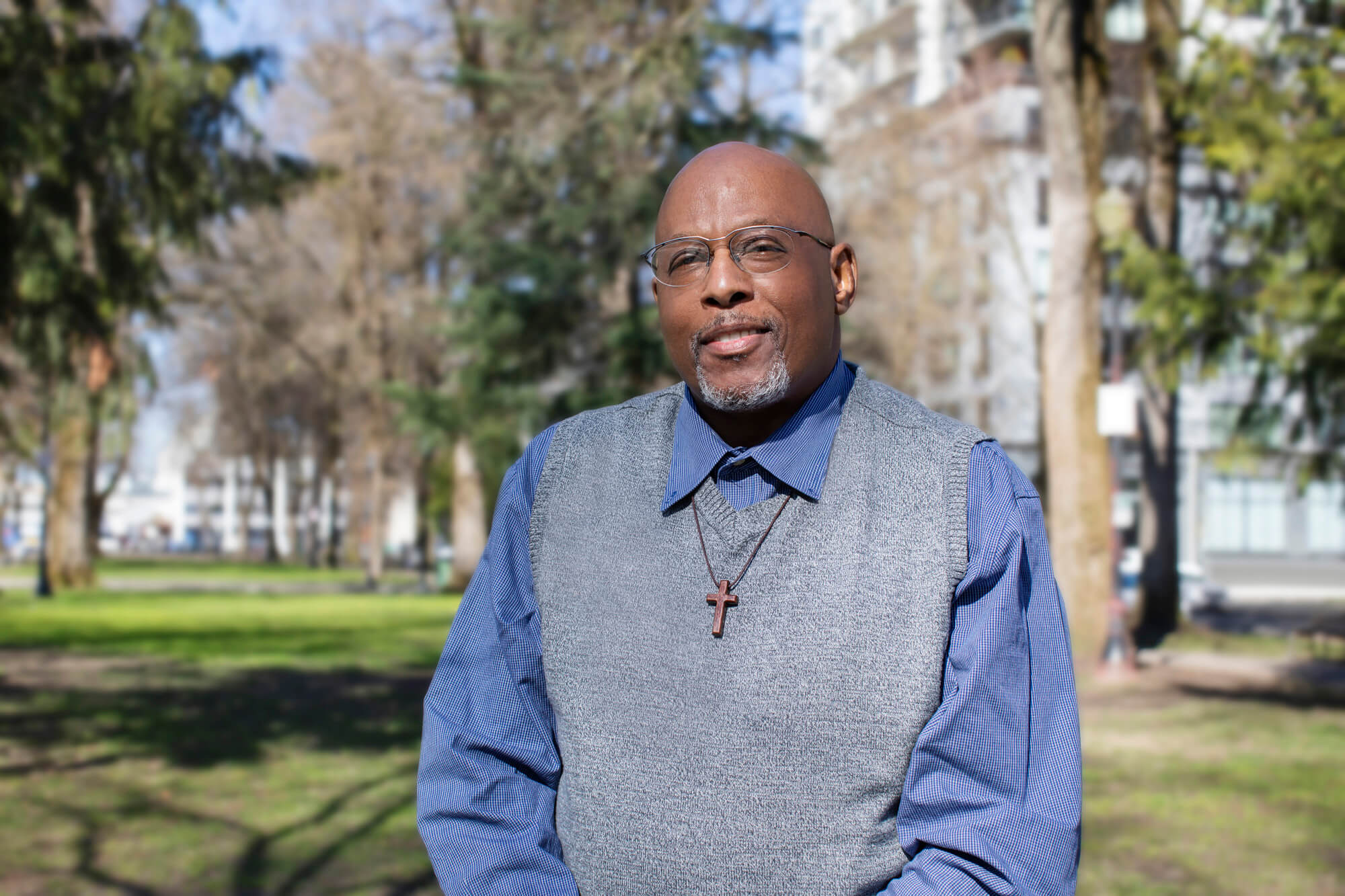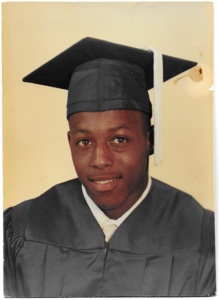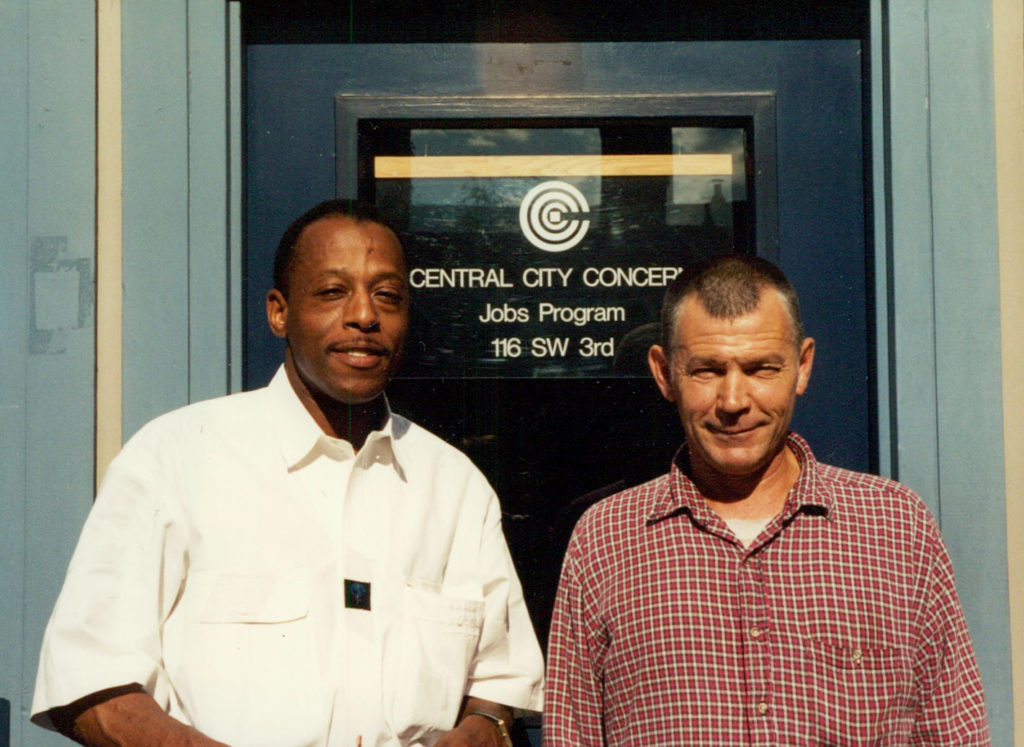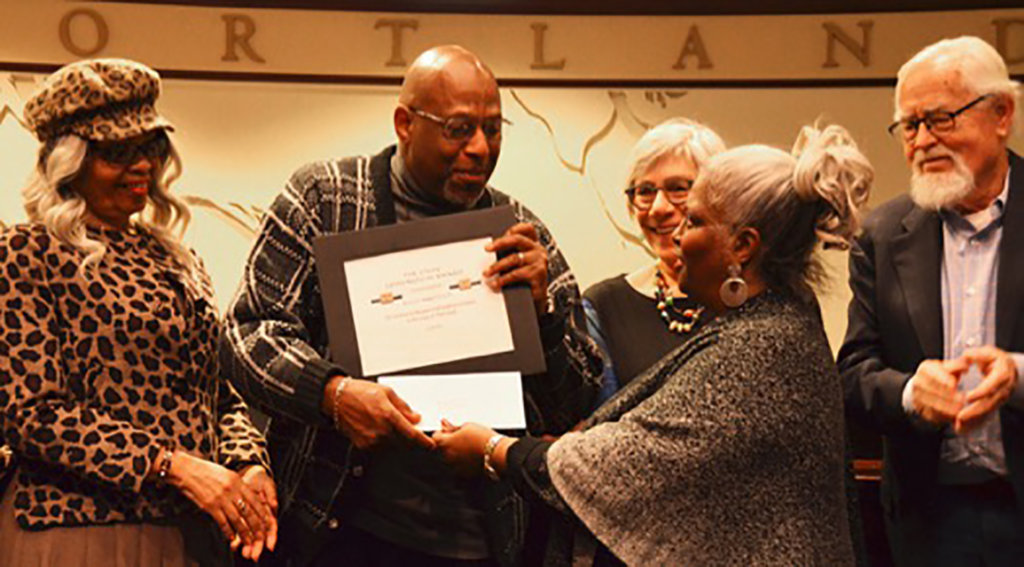
Этот блок содержимого не имеет предварительного просмотра.
This is Part 2 of our series that centers Billy Anfield, CCC’s Flip the Script Advocacy Coordinator, Public Policy Organizing Coordinator, and a longtime CCC employee. Look back at Part 1 to learn how Billy’s rich family history has echoed the experience of many Black Portlanders through the generations.
A life falls apart
After an idyllic youth in North Portland’s Albina District, Billy left home for the University of Oregon in 1966. That’s when everything fell apart. He rebelled against his strict and over-protective upbringing and started experimenting with drugs. He left school after just one year. When he returned to his family’s house on Haight Street, things got worse.

Billy graduated from Lincoln High School in 1966, full of promise and ambition. Then he fell into addiction and lost his way.
“Physically, I lived at home with my parents. But I was palling around with people who weren’t doing good things. We were smoking weed, taking acid. I turned into an addict.”
“For the next 20 years – you name it, I was doing it. Getting into trouble. Going to jail. Embarrassing my family. Being in the newspaper.”
Billy was homeless and estranged from his family for much of that time.
Then Billy committed a felony and entered treatment. He says, “A judge mandated me there instead of going to prison for forty years. My family begged for mercy, and that was my savior. I was ill. I needed treatment, not jail.” In 1986, Billy’s sister flew with him to Houston and he entered a three-year intensive treatment program.
He believes it saved his life.
While in treatment, Billy trained to become a medical assistant. He worked for the program, helping others walk their paths to recovery while he did the same. The job boosted his confidence and motivated him to keep going. In fact, Billy loved his work so much that he stayed on as an employee for two more years after graduating — until 1991, when his mother called to say she was sick and needed him at home.
“I didn’t think twice,” Billy says.
It was an opportunity, he says, to prove he was a “different man.”
A different man
With a criminal record and history of substance use disorder, finding employment back in Portland was tough. Finally, Billy heard there might be a job at Central City Concern, which was known for being a second-chance employer. He was feeling desperate and ready to start at the bottom.
“At that time, the agency was renovating the Shoreline Hotel,” he recalls. “Somebody was breaking in at night and stealing tools, so they needed a security person.”
Billy thought he’d take what he could get, even though the job wouldn’t use his skills. He interviewed with Richard Harris, Director of Chemically Dependent Services, and brought up his experiences during treatment in Houston. When Billy overheard talk about folks interviewing to run a treatment hotline, he spoke up.
“I said, ‘Sir, I’d like to interview for that position,’” Billy recalls.
His phone rang the next morning. He didn’t get the security job at the Shoreline. Instead, CCC asked him to become the building manager. He jumped at the chance.
Building a culture of change
That phone call in 1991 was the start of an inspiring 26-year career of service and activism at CCC.
In just a few short years, Billy moved from Shoreline building manager to running a new supportive employment program in the same building. In 1994, he proposed that CCC combine recovery, supportive housing and employment support — he got the idea from his own experience of the power of building job skills while in treatment.
Billy became the first director of CCC’s new Jobs Program. It became a huge success.
“We created a culture of positivity, a working culture,” Billy says.
“Folks were talking to each other, saying, ‘Hey, they’re hiring at such and such a place.’ They were sharing tips, putting announcements on the bulletin board. All the showers would go off at the same time each morning — they’d be saying, ‘Save me some hot water!’ When folks moved out, they’d have $1,500 to $2,000 saved up, so they could get a place in the community. They were set up for success.”
Billy’s Jobs Program laid the groundwork for what would become CCC’s Центр доступа к трудоустройству. Last year, despite the pandemic, the EAC provided employment support for more than 1,300 people, many of them in recovery or exiting homelessness.

Billy Anfield (left) in the ‘90s, as the first director of CCC’s Jobs Program. In 1995, Billy was named Director of the Year by Willamette Week.
Reflecting on the past
Today, Billy’s lived experience informs his work as the advocacy coordinator for CCC’s reentry program, Переверните сценарий, which supports recently released Black men and women through access to housing, health care, jobs and peer support. Billy coordinates the Flip the Script Advocacy Group, a team of program participants and alumni pushing for criminal justice reform and greater equity for people with criminal records.
When George Floyd was murdered by police in May 2020, Billy reached out to his clients on CCC’s behalf. After just three phone calls, it was clear that an in-person gathering was necessary, despite the COVID pandemic. Flip the Script clients — all of whom have recent, and often repeated, experience with the justice system — were scared and hurting. Billy was too.
“It was the same suffering my mom and dad talked about at the kitchen table. It was historical trauma. All those scars and scabs just torn wide open.”
So the Flip the Script Advocacy Group came together for a physically-distanced gathering. They cried and shouted and voiced their fear and rage. Then the next week, they met again and discussed reform — how they might advocate for legislation that could make a real difference, with CCC’s support.
Billy reflected on how different it was from some of his early experiences at the agency in the ‘90s. It wasn’t easy to be one of the first Black employees. He remembers being told his suits were too loud, his language too rough. Three decades later, it still hurts.
Now he believes CCC is on the right path toward becoming an anti-racist agency — with more work ahead.
“CCC has heard the call,” Billy says.

Billy and his beloved wife Anna (far left) at the Steve Lowenstein Trust Award ceremony in 2019, where Billy was honored for his impactful service and community activism. Billy’s mentor and friend, former CCC director Richard Harris (far right) was present to celebrate his achievements. (Photo credit Lowenstein Trust)
What matters most
Despite the accolades and respect from Billy’s community, colleagues, even city government, what matters most to Billy is his family.
“I’ve been in recovery for 34 years, and I’ve worked hard to convince my family I’m a changed man,” Billy says.
“I’ve won my family back, my kids, my grandkids, my son Billy who thought I’d abandoned him. When my parents passed away, I had worked at CCC for ten years. They were both proud of me and the work I was doing. They were proud of how I changed.”
Compassion, love and second chances
Billy’s successes and personal values are built upon the experiences of generations. His family story — from his great-uncle Dr. Adair in Alabama during the Civil Rights movement to his parents in Albina in the 1950s to his own experience as a Black man growing up in America — echoes the histories of so many of our clients and community members. It’s a story of resilience in the face of repeated hardship and systemic barriers.
And for Billy Anfield, it’s a story about how compassion, love and second chances can lift people up from the greatest despair.
Этот блок содержимого не имеет предварительного просмотра.
Billy is one of nearly 1,000 CCC employees, many of whom share lived experience with our clients — and all of whom share Billy’s passion for supporting others in finding healing and self-sufficiency. Узнать больше about employment at CCC and how we’re cultivating a culture of compassion within our organization.